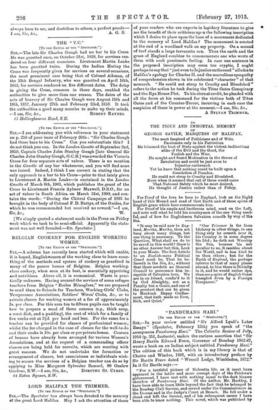of your readers who are experts in lapidary literature to
give • me the benefit of their criticism upon the following inscription which I desire to place upon the base of a monument dedicated to the memory of Lord Halifax P The monument is erected at the end of a woodland walk on my property. On a mound of turf stands a large terracotta urn. Thus the earth and the grass of England combine to commemorate one who wrote of them with such passionate feeling. In case one sentence in the proposed inscription may seem too cryptic, I ought perhaps to say that "just even to Injustice enthroned" alludes to Halifax's apology for Charles II. and the marvellous sympathy of comprehension shown in his celebrated "character" of that monarch. " He could not stoop to Cruelty and Bloodshed" refers to the action he took during the Titus Oates Conspiracy and the Rye House Plot. To his eternal credit, he pleaded with all the force at his command for the victims both of Titus Oates and of the Counter-Terror, incurring in each ease the suspicion of those in power at the moment.—I am, Sir, Re., A SYLVAN TRIMMER,
To THE PIOUS AND IMMORTAL MEMORY OD GEORGE SAVILE, MARQUESS OF HALIFAX.
The most Inspired of Politicians and of Wits. Passionate only in his Patriotism He trimmed the boat of State against the violent inclinations alike of the Evil and the Good, the Foolish and the Wise. He sought and found Moderation in the throes of Revolution and could be just even to Injustice enthroned. Yet he knew that nothing could be built upon a foundation of Paradox. He could not steep to Cruelty and Bloodshed. Even when it seemed that out of these would come That National Safety which he most desired, He thought of Justice rather than of Policy.
For Proof of the love he bore to England, look on the Right hand of this Mound and read of that Earth and of those apirea of English grass which here commemorate him. For Proof of his ample and luciferous mind, read on the Loft, and note well what he told his countrymen of the one thing need- ful, and of how for Englishmen Salvation cometh by way of the Sea.
"It may be said now to Eng- land, Martha, Martha, thou art busy about many things, but one thing is necessary. To the Question, What shall we do to be saved in this world P there is no other Answer but this, Look to your Moats. The first Article to an English-mans Political Creed must be, That he he- lieveth in the Sea, Se., without that there needeth no General Council to pronounce him in- capable of Salvation here. We are in an Island, confin'd to it by God Almighty, not as a Penalty but a Grace, and one of the greatest that can be given to Mankind. Happy Confine- ment, that bath made us Free, Rich, and Quiet." "Our Trimmer is far from Idolatry in other things, in one thing only be eometh near it, his Country is in some degree his Idol ; he doth not Worship the Sun, because 'tis not peculiar to us, it rambles about the World, and is lees kind to us than others ; but for the Earth of England, the perhaps inferior to that of many places abroad, to him there is Divinity in it, and he would rather dye, than see a spire of English Grass trampled down by a Foreign Trespasser."


































 Previous page
Previous page